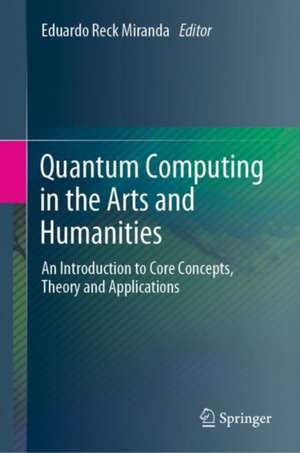Quantum Computing in the Arts and Humanities: An Introduction to Core Concepts, Theory and Applications
Editat de Eduardo Reck Mirandaen Limba Engleză Hardback – 6 mai 2022
The development of conventional digital computing technology for the arts and humanities has been progressing in tandem with the evolution of computers since the 1950s. Today, computers are absolutely essential for the arts and humanities. Therefore, future developments in QC are most likely to impact on the way in which artists will create andperform, and how research in the humanities will be conducted.
This book presents a comprehensive collection of chapters by pioneers of emerging interdisciplinary research at the crossroads of quantum computing, and the arts and humanities, from philosophy and social sciences to visual arts and music.
Prof. Eduardo Reck Miranda is a composer and a professor in Computer Music at Plymouth University, UK, where he is a director of the Interdisciplinary Centre for Computer Music Research (ICCMR). His previous publications include the Springer titles Handbook of Artificial Intelligence for Music, Guide to Unconventional Computing for Music, Guide to Brain-Computer Music Interfacing and Guide to Computing for Expressive Music Performance.
| Toate formatele și edițiile | Preț | Express |
|---|---|---|
| Paperback (1) | 934.23 lei 6-8 săpt. | |
| Springer International Publishing – 6 mai 2023 | 934.23 lei 6-8 săpt. | |
| Hardback (1) | 940.65 lei 6-8 săpt. | |
| Springer International Publishing – 6 mai 2022 | 940.65 lei 6-8 săpt. |
Preț: 940.65 lei
Preț vechi: 1175.81 lei
-20% Nou
Puncte Express: 1411
Preț estimativ în valută:
180.02€ • 187.25$ • 148.61£
180.02€ • 187.25$ • 148.61£
Carte tipărită la comandă
Livrare economică 15-29 aprilie
Preluare comenzi: 021 569.72.76
Specificații
ISBN-13: 9783030955373
ISBN-10: 3030955370
Pagini: 367
Ilustrații: IX, 367 p. 158 illus., 63 illus. in color.
Dimensiuni: 155 x 235 mm
Greutate: 0.71 kg
Ediția:1st ed. 2022
Editura: Springer International Publishing
Colecția Springer
Locul publicării:Cham, Switzerland
ISBN-10: 3030955370
Pagini: 367
Ilustrații: IX, 367 p. 158 illus., 63 illus. in color.
Dimensiuni: 155 x 235 mm
Greutate: 0.71 kg
Ediția:1st ed. 2022
Editura: Springer International Publishing
Colecția Springer
Locul publicării:Cham, Switzerland
Cuprins
From digital humanities to quantum humanities: Potentials and applications.- Quantum computing and cognitive simulation.- The philosophy of quantum computing.- Quantum-like cognition and rationality: Biological and artificial intelligence systems.- Quantum music, quantum arts and their perception.- Quanta in sound, the sound of quanta: A voice-informed quantum theoretical perspective on sound.- Quantum cinema and quantum computing.- How to make qubits speak.- A quantum computing approach to harnessing the logic of the mind for brain-computer interfacing.- The history of games for (quantum) computers.
Notă biografică
Prof. Eduardo Reck Miranda is a composer and professor in Computer Music at Plymouth University, UK, where he is a director of the Interdisciplinary Centre for Computer Music Research (ICCMR). His previous publications include the Springer titles Handbook of Artificial Intelligence for Music, Guide to Unconventional Computing for Music, Guide to Brain-Computer Music Interfacing and Guide to Computing for Expressive Music Performance.
Textul de pe ultima copertă
Quantum computing (QC) is surfacing as a promising disruptive technology in the field of computer science. Built on the principles of quantum mechanics, QC can run algorithms that are not trivial to run on digital computers. Unprecedented new uses for this technology are bound to emerge from ongoing research.
The development of conventional digital computing technology for the arts and humanities has been progressing in tandem with the evolution of computers since the 1950s. Today, computers are absolutely essential for the arts and humanities. Therefore, future developments in QC are most likely to impact on how research in the humanities will be conducted and the way in which artists will create and perform. This integrating book delivers a diverse collection of chapters by pioneers of emerging interdisciplinary research at the crossroads of quantum computing, and the arts and humanities.
Topics & features:
Prof. Eduardo Reck Miranda is a composer and a professor in Computer Music at Plymouth University, UK, where he is a director of the Interdisciplinary Centre for Computer Music Research (ICCMR). His previous publications include the Springer titles Handbook of Artificial Intelligence for Music, Guide to Unconventional Computing for Music, Guide to Brain-Computer Music Interfacing and Guide to Computing for Expressive Music Performance.
The development of conventional digital computing technology for the arts and humanities has been progressing in tandem with the evolution of computers since the 1950s. Today, computers are absolutely essential for the arts and humanities. Therefore, future developments in QC are most likely to impact on how research in the humanities will be conducted and the way in which artists will create and perform. This integrating book delivers a diverse collection of chapters by pioneers of emerging interdisciplinary research at the crossroads of quantum computing, and the arts and humanities.
Topics & features:
- Presents the first work dedicated tothe topic of QC in the arts and humanities
- Offers accessible coverage for audiences without a strong background in quantum physics and mathematics, including humanities researchers and those involved in entertainment and the creative arts
- Covers topics at the crossroads of QC, from philosophy and social sciences to games and music
- Provides insights from leading scholars in the arts and humanities who are pioneering the use of QC in their fields
Prof. Eduardo Reck Miranda is a composer and a professor in Computer Music at Plymouth University, UK, where he is a director of the Interdisciplinary Centre for Computer Music Research (ICCMR). His previous publications include the Springer titles Handbook of Artificial Intelligence for Music, Guide to Unconventional Computing for Music, Guide to Brain-Computer Music Interfacing and Guide to Computing for Expressive Music Performance.
Caracteristici
Presents the first work dedicated to the topic of quantum computing in the arts and humanities Is accessible to audiences without a strong background in quantum physics and mathematics Provides insights from scholars in the arts and humanities who are pioneering use of quantum computing
